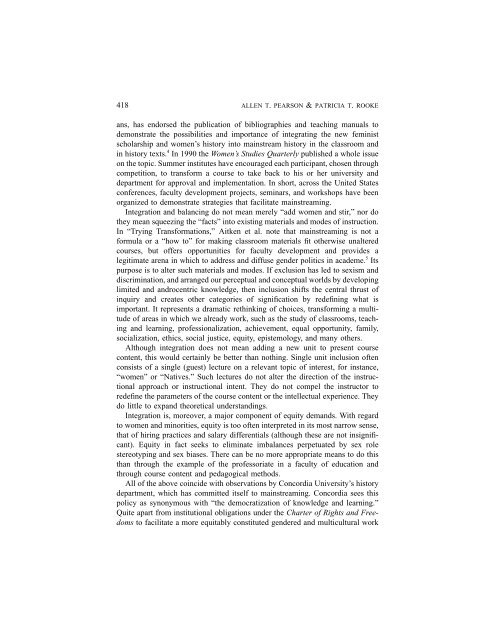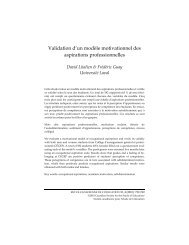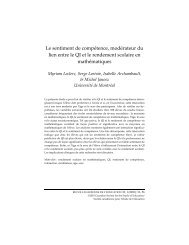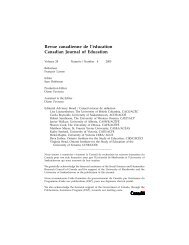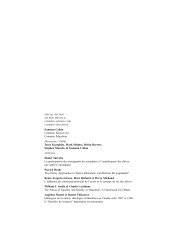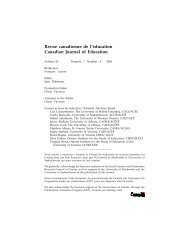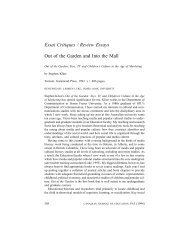Mireille Falardeau et Michel Loranger Le choix de stratégies ... - CSSE
Mireille Falardeau et Michel Loranger Le choix de stratégies ... - CSSE
Mireille Falardeau et Michel Loranger Le choix de stratégies ... - CSSE
Create successful ePaper yourself
Turn your PDF publications into a flip-book with our unique Google optimized e-Paper software.
418 ALLEN T. PEARSON & PATRICIA T. ROOKE<br />
ans, has endorsed the publication of bibliographies and teaching manuals to<br />
<strong>de</strong>monstrate the possibilities and importance of integrating the new feminist<br />
scholarship and women’s history into mainstream history in the classroom and<br />
in history texts. 4 In 1990 the Women’s Studies Quarterly published a whole issue<br />
on the topic. Summer institutes have encouraged each participant, chosen through<br />
comp<strong>et</strong>ition, to transform a course to take back to his or her university and<br />
<strong>de</strong>partment for approval and implementation. In short, across the United States<br />
conferences, faculty <strong>de</strong>velopment projects, seminars, and workshops have been<br />
organized to <strong>de</strong>monstrate strategies that facilitate mainstreaming.<br />
Integration and balancing do not mean merely “add women and stir,” nor do<br />
they mean squeezing the “facts” into existing materials and mo<strong>de</strong>s of instruction.<br />
In “Trying Transformations,” Aitken <strong>et</strong> al. note that mainstreaming is not a<br />
formula or a “how to” for making classroom materials fit otherwise unaltered<br />
courses, but offers opportunities for faculty <strong>de</strong>velopment and provi<strong>de</strong>s a<br />
legitimate arena in which to address and diffuse gen<strong>de</strong>r politics in aca<strong>de</strong>me. 5 Its<br />
purpose is to alter such materials and mo<strong>de</strong>s. If exclusion has led to sexism and<br />
discrimination, and arranged our perceptual and conceptual worlds by <strong>de</strong>veloping<br />
limited and androcentric knowledge, then inclusion shifts the central thrust of<br />
inquiry and creates other categories of signification by re<strong>de</strong>fining what is<br />
important. It represents a dramatic r<strong>et</strong>hinking of choices, transforming a multitu<strong>de</strong><br />
of areas in which we already work, such as the study of classrooms, teaching<br />
and learning, professionalization, achievement, equal opportunity, family,<br />
socialization, <strong>et</strong>hics, social justice, equity, epistemology, and many others.<br />
Although integration does not mean adding a new unit to present course<br />
content, this would certainly be b<strong>et</strong>ter than nothing. Single unit inclusion often<br />
consists of a single (guest) lecture on a relevant topic of interest, for instance,<br />
“women” or “Natives.” Such lectures do not alter the direction of the instructional<br />
approach or instructional intent. They do not compel the instructor to<br />
re<strong>de</strong>fine the param<strong>et</strong>ers of the course content or the intellectual experience. They<br />
do little to expand theor<strong>et</strong>ical un<strong>de</strong>rstandings.<br />
Integration is, moreover, a major component of equity <strong>de</strong>mands. With regard<br />
to women and minorities, equity is too often interpr<strong>et</strong>ed in its most narrow sense,<br />
that of hiring practices and salary differentials (although these are not insignificant).<br />
Equity in fact seeks to eliminate imbalances perp<strong>et</strong>uated by sex role<br />
stereotyping and sex biases. There can be no more appropriate means to do this<br />
than through the example of the professoriate in a faculty of education and<br />
through course content and pedagogical m<strong>et</strong>hods.<br />
All of the above coinci<strong>de</strong> with observations by Concordia University’s history<br />
<strong>de</strong>partment, which has committed itself to mainstreaming. Concordia sees this<br />
policy as synonymous with “the <strong>de</strong>mocratization of knowledge and learning.”<br />
Quite apart from institutional obligations un<strong>de</strong>r the Charter of Rights and Freedoms<br />
to facilitate a more equitably constituted gen<strong>de</strong>red and multicultural work


